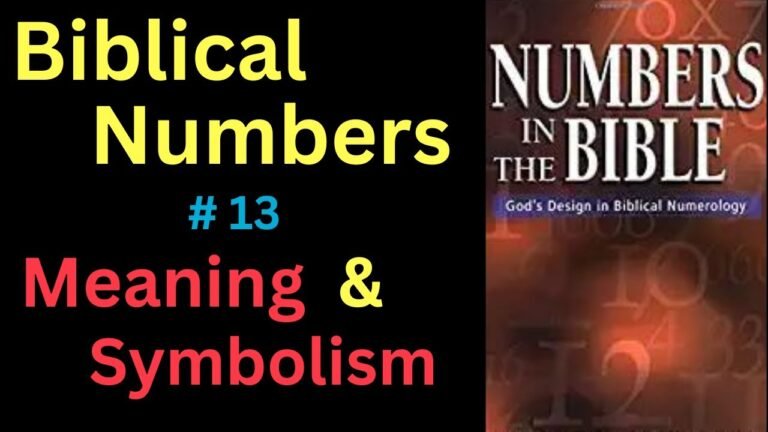Understanding Deliverance in Biblical Context
The concept of deliverance in the Bible embodies a profound sense of liberation and salvation, resonating deeply within the faith. Rooted in both the Old and New Testaments, deliverance signifies God’s intervention in human affairs, offering freedom from sin, oppression, and spiritual bondage. This powerful theme not only highlights God’s mercy and grace but also serves as a source of hope and encouragement for believers seeking redemption and guidance in their lives. Understanding deliverance’s biblical meaning invites a deeper exploration of faith, resilience, and the transformative power of divine support.
- Deliverance in the Bible often refers to God’s intervention to rescue individuals from danger, sin, or oppression, highlighting His power and mercy in providing salvation and freedom.
- The concept is closely associated with themes of redemption, where deliverance signifies not only physical rescue but also spiritual liberation, emphasizing the transformative relationship between God and His people.
What does deliverance symbolize in a spiritual context?
Deliverance holds a profound spiritual significance within Christianity, serving as a powerful means to liberate individuals from the grips of evil spirits, often referred to as demons. This practice aims to help believers confront and overcome negative behaviors, feelings, and experiences by harnessing the transformative power of the Holy Spirit. While interpretations and acceptance of deliverance ministries vary among Christians, its core purpose remains centered on fostering healing and empowerment, allowing individuals to reclaim their lives and faith.
What is the Bible’s perspective on deliverance?
The concept of deliverance in the Bible is profoundly illustrated through the life and teachings of Jesus Christ in the New Testament. He stands as the ultimate deliverer, providing a pathway to spiritual freedom from sin and the fear of eternal death. Paul’s letters, particularly in Romans and Galatians, highlight this transformative power, assuring believers that Christ’s sacrifice opens the door to a new life free from the bondage of sin.
In addition to spiritual redemption, the Bible reinforces the importance of deliverance from temptation and evil forces. Jesus himself teaches his followers to seek protection from these threats, as seen in the Lord’s Prayer, where believers are encouraged to ask for deliverance from evil. This theme resonates throughout the New Testament, emphasizing that divine assistance is available to those who face moral and spiritual challenges.
The promise of deliverance is not just a historical account but a living assurance for believers today. Through faith in Christ, individuals are empowered to overcome trials and tribulations, finding hope and strength in God’s unwavering support. This message of deliverance serves as a beacon of hope, inviting all to experience the profound peace that comes from trusting in Him.
What does deliverance mean in Hebrew?
In the Hebrew scriptures, the concept of deliverance is captured through several significant terms, each embodying the essence of salvation and rescue. The primary words associated with this theme are hatzalah, teshuah, and yeshua. These terms reflect a deep-rooted understanding of divine intervention, where individuals seek relief from their struggles and adversities.
Each of these words carries a weight of meaning that resonates within the fabric of faith and hope. Hatzalah emphasizes the act of rescue, while teshuah conveys the idea of salvation. Yeshua, perhaps the most well-known, encapsulates the notion of deliverance and is often associated with spiritual liberation. Together, they highlight the profound belief in a higher power that provides refuge and support in times of need.
Exploring Spiritual Liberation Through Scripture
Spiritual liberation is a journey that transcends the confines of tradition and belief, inviting individuals to delve deep into the profound wisdom of scripture. Texts from various spiritual traditions offer insights that illuminate the path toward inner freedom, encouraging seekers to reflect on their own lives and experiences. By engaging with these sacred writings, we can discover universal truths that resonate across cultures, fostering a sense of connection and empowerment.
As we explore the narratives and teachings found within scripture, we are often met with transformative messages of love, forgiveness, and self-discovery. These timeless principles invite us to shed the burdens of fear and guilt, guiding us toward a state of grace and acceptance. The act of reading and meditating on scripture becomes a powerful practice, allowing us to cultivate mindfulness and deepen our understanding of the self and the divine.
Ultimately, the journey of spiritual liberation through scripture is one of awakening. It challenges us to confront our limitations and embrace the possibility of growth and renewal. By integrating the lessons gleaned from sacred texts into our daily lives, we can break free from the chains of doubt and insecurity, stepping into a more authentic existence filled with purpose and joy. In this exploration, we not only find solace but also the courage to live out our spiritual truths with authenticity and passion.
The Role of Faith in Overcoming Bondage
Faith serves as a powerful catalyst for transformation, enabling individuals to break free from the chains of bondage that can imprison their minds and spirits. In times of struggle, belief in a higher purpose offers hope and direction, illuminating a path toward liberation. This unwavering trust can inspire individuals to confront their fears and limitations, pushing them to seek change and embrace new possibilities.
Moreover, faith fosters resilience, empowering people to persevere through adversity. It nurtures a sense of community and support, reminding individuals that they are not alone in their battles. This collective strength can amplify personal resolve, encouraging individuals to share their burdens and celebrate their victories together. The bonds formed through shared faith can create a foundation for healing and growth, reinforcing the belief that freedom is attainable.
Ultimately, faith not only serves as a source of strength but also as a guiding light in the journey toward self-discovery and empowerment. By anchoring themselves in their beliefs, individuals can redefine their identities and reclaim their narratives. This transformative process not only liberates them from past limitations but also inspires others to embark on their own journeys of faith, hope, and renewal.
Insights into Divine Rescue Narratives
Throughout history, divine rescue narratives have captivated human imagination, offering profound insights into the intersection of faith and human resilience. These stories, often steeped in cultural and spiritual significance, reflect the belief that higher powers intervene during our darkest moments, guiding individuals toward hope and redemption. From ancient texts to modern retellings, these tales serve not only as moral compasses but also as reminders of the strength found in community and the transformative power of hope. By exploring these narratives, we uncover the enduring connections between humanity and the divine, illustrating how faith can inspire courage in the face of adversity.
Biblical Perspectives on Freedom and Healing
In the Bible, freedom and healing are intricately linked, reflecting the holistic nature of spiritual well-being. Throughout scripture, liberation from sin, oppression, and physical ailments is often portrayed as a divine gift, emphasizing that true freedom is found in a close relationship with God. For instance, Jesus’ ministry was marked by acts of healing, symbolizing not just physical restoration but also the release from spiritual bondage. This interconnectedness highlights that genuine healing involves both the body and the soul, inviting believers to embrace faith as a pathway to wholeness. Ultimately, the biblical narrative reveals that true freedom is not merely the absence of constraints, but the presence of God’s transformative love and grace in our lives.
Unpacking the Concept of Deliverance in the Bible
Deliverance in the Bible embodies the profound act of liberation from sin, suffering, and spiritual bondage, reflecting God’s unwavering grace and mercy. Throughout both the Old and New Testaments, we see vivid examples of deliverance, from the Israelites’ escape from Egyptian slavery to the transformative healing of individuals by Jesus. This concept not only emphasizes physical freedom but also highlights the importance of spiritual renewal, inviting believers to experience a deeper relationship with God. Ultimately, deliverance serves as a testament to divine intervention, assuring us that hope and redemption are always within reach for those who seek it.
The concept of deliverance in the Bible transcends mere rescue; it embodies a profound spiritual awakening and liberation from sin, oppression, and despair. This sacred promise serves as a reminder of God’s unwavering love and commitment to His people, offering hope and renewal in the face of life’s trials. Embracing the true essence of deliverance invites believers to experience transformative healing and a deeper connection with their faith, encouraging a life enriched by grace and divine purpose.







